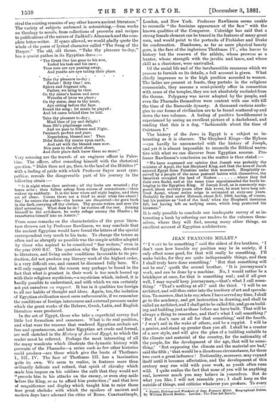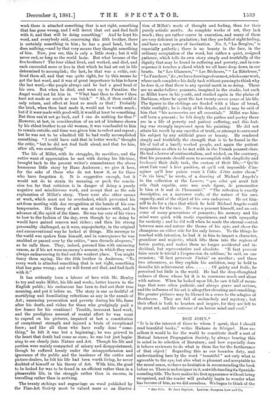JEAN FRANCOIS MILLET.*
" I WANT to be something !' said the eldest of five brothers. I don't care how humble my position may be in society, if I only effect some good, for that will really be something. I'll make bricks, for they are quite indispensable things, and then I shall truly have done something.' 'But that something will not be eno',' quoth the second brother. It is journeyman's work, and can be done by a machine. No, I would rather be a bricklayer at once, for that is something real ; and if all goes well, I may myself keep journeymen,—that's what I call some- thing.' 'That's nothing at all !' said the third. I will be an architect, and will thus enter into the territory of art and specula- tion. To-morrow, that is to say,when I have served my time, I shall go to the academy, and get instruction in drawing, and shall be called an architect, and I shall get to be called Sir, and go on build- ing and building just as those before me have built. That will be always a thing to remember, and that's what I call something !' But I don't care at all for that something,' said the fourth. 'I won't sail in the wake of others, and be a copyist. I will be a genius, and stand up greater than you all. I shall be a creator of a new style, and will give the plan of a building suitable to the climate and material of the country, for the nationality of the people, for the development of the age, that will be some-
thing.' supposing the climate and the material are bad,' said the fifth ; that would be a disastrous circumstance, for these two exert a great influence ! Nationality, moreover, may expand itself until it becomes affectation, and the development of this century may run wild with your work, as youth often runs wild. I quite realise the fact that none of you will be anything real, however much you may believe in yourselves. But do what you like, I will not resemble you ; I shall keep on the outside of things, and criticise whatever you produce. To every
• Twenty Etchings and Woodcuts of Jean Francois Millet. Biographical Notice. By William Ernest Henley. London: The Fine-Art Society.
work there is attached something that is not right, something that has gone wrong, and I will ferret that out and find fault with it, and that will be doing something.' And he kept his word, and everybody said, concerning this fifth brother, there is certainly something in him ; he has a good head, but he does nothing,—and by that very means they thought something of him. Now, you see, this is only a little story ; but it will never end, so long as the world lasts. But what became of the five brothers ? The four eldest lived, and worked, and died, and each succeeded more or less in that which he had set out in life determined to accomplish ; the last, he that was a critic, out- lived them all, and that was quite right, for by this means he got the last word, and it was of great importance to him to have the last word,—the people always said he had a good head of his own. But when he died, and went up to Paradise, the Angel would not let him in. "What East thou to show ? thou hast not made as much as one brick." " Ah, if thou could'st only return, and effect at least so much as that ! Probably the brick, when thou East made it, would not be worth much ; but if it were made with good-will, it would at least be something. But thou can'st not go back, and I can do nothing for thee !" However, at last, in consideration of an act of kindness shown by his eldest brother to an old woman, it was vouchsafed to him to remain outside, and time was given him to reflect and repent ; but he was not to be admitted till he had really accomplished something. "I could have said that in better words," thought the critic, "but he did not find fault aloud, and that for him, after all, was something."
The life of Millet, with its struggles, its sacrifices, and the entire want of appreciation he met with during his life-time, brought back to the present writer's remembrance the above humorous little story by Hans Andersen ; we give it here, for the sake of those who do not know it, or for those who have forgotten it. It is suggestive enough, but it would not do to strain its meaning, or push the conclu- sion too far that criticism is in danger of doing a purely negative and mischievous work, and accept that as the sole explanation of Millet's story. There were also other causes at work, which must not be overlooked, which prevented his art from meeting with due recognition at the hands of his con- temporaries. His theory of art was at variance with, and in advance of, the spirit of the times. He was too sure of his views to bow to the fashion of the day, even though by so doing he would have gained renown and riches ; and then his strong personality challenged, as it were, unpopularity, in the original and unconventional way he looked at things. His message to the world was spoken from himself, and in consequence he was snubbed or passed over by the critics, " mes eternels aboyeurs," as he calls them. They, indeed, pursued him will unceasing venom, as if his art were an enemy's armour, in which they were always endeavouring to find out the weakest place. You might fancy them saying, like the fifth brother in Andersen, "To every work is attached something that is not right, something that has gone wrong; and we will ferret out that, and find fault with it."
It has evidently been a labour of love with Mr. Henley to try and make Millet, his life and works, better known to the English public; his endeavour has been to find out their true meaning, and put it before us. The story is one as fruitful of mortifying and humiliating reflections as any in the annals of Art ; unceasing persecution and poverty during his life, fame after his death, and riches for those who grudgingly paid a few francs for his creations ! Trouble, incessant hard work, and the prodigious amount of mental effort be was wont to expend on his pictures, impaired at last a constitution of exceptional strength and injured a brain of exceptional force ; and like all those who have really done "some- thing," he felt it was but a beginning ; he was grieved to the heart that death had come so soon ; he was but just begin- ning to see clearly iinto Nature and Art. Though his life and portion were mainly compacted of misery and disappointment, though he suffered keenly under the misapprehension and ignorance of the public and the insolence of the critics and picture-dealers, he felt his life had been worth living, he never doubted of himself or his theory of Art. With him, the good to be looked for was to be found in an efficient rather than in a pleasurable life, in the struggle rather than in success, in travelling rather than in arriving.
The twenty etchings and engravings on wood published by the Fine-Art Society must be valued more as an illustra- tion of Millet's mode of thought and feeling, than for their purely artistic merits. As complete works of art, they lack much ; they are rather coarse in execution, and many of them are very deficient in gradation ; but they are full of right feeling, and have a rare power of fascination. No. 9, "La BerOre," is especially pathetic ; there is no beauty in the face, in the ordinary acceptation of the word, but rather a quiet, resigned patience, which tells its own story simply and truthfully of the dignity that may be found in suffering and poverty, and in con- sequence it touches a chord which we all have deep down in our hearts. In" Les Glaneurs," " Les Becheurs," " La Riiteleuse," "Le Faucheur," &c. ,we have drawings of earnest, wholesome work, where each completes his daily task without pansingto think why he does it, or that there is any special merit in so doing. These are no make-believe peasants, imagined in the studio, but such as Millet knew in his youth, and studied again in the plains of Barbizon, where he spent the last twenty-seven years of his life. The figures in the etchings are flooded with a blaze of broad, white sunlight ; he is chary of his details, and it may be said of him that "his accessories are all essentials." Millet was him- self born a peasant ; he felt deeply the pathos and poetry there are in a life of poverty and patient suffering, and this feel- ing was strongly impressed upon his painting. He did not attain his result by any sacrifice of truth, or attempt to surround his subject by any artificial grace or beauty. He rendered simply and truthfully the strength that is to be found in the life of toil of a hardly worked people, and again the patient resignation so often to be met with in the French peasant class. He had a horror of sentimentalism, and wished, on the contrary, that his peasants should seem to accomplish with simplicity and bonhomie their daily task, the custom of their life,—" Qu'ils aient l'air vou ii leur position, et qu'il soit impossible d'im-
aginer qu'il leur puisse venir h l'idee autre chose." " Je vis hien," he wrote, of a drawing of Michael Angelo's in the collection at the Louvre, " que celui qui avait fait cela &aft capable, avec nue seule figure, de personnifler le Lien et le rnal de l'humanite." "The reflection is exactly descriptive, on a narrower scale, of the nature of his own capacity, and of the object of his own endeavour. He set him- self to do for a class that which he held Michael Angelo could have done for the race. He was a peasant himself, and an out- come of many generations of Peasants; his memory and his mind were quick with rustic experiences, and with sympathy for rusticity ; and he did well when he made the eternal contest between man and nature the theme of his epic, and chose the champions on either side for his only heroes. To the things he touched with intention, he had it in him to impart a character, grandiose and majestic, which lifts them into the regions of heroic poetry, and makes them no longer accidental and in- dividual, but representative and absolute. II faut pouvoir faire servir le trivial a l'expression du sublime,' he said, on one occasion ; '11 faut percevoir l'infini ' on another ; and these two utterances, as they explain his ambition, may be held to describe his achievement also Of gaiety and frolic, he perceived but little in the world. He had the deep-thoughted sadness of those whose lot it is to commune much and alone with nature. When he looked upon life, he saw it full of mean- ings that were often pathetic, and always grave and serious', and the influence of his art is altogether elevating and ennobling. His greater pictures may be likened in a sense to the adagios of Beethoven. They are full of melancholy and mystery ; but their effect is both to hearten and inspire, for they are felt to be great art, and the outcome of an heroic mind and soul."







































 Previous page
Previous page